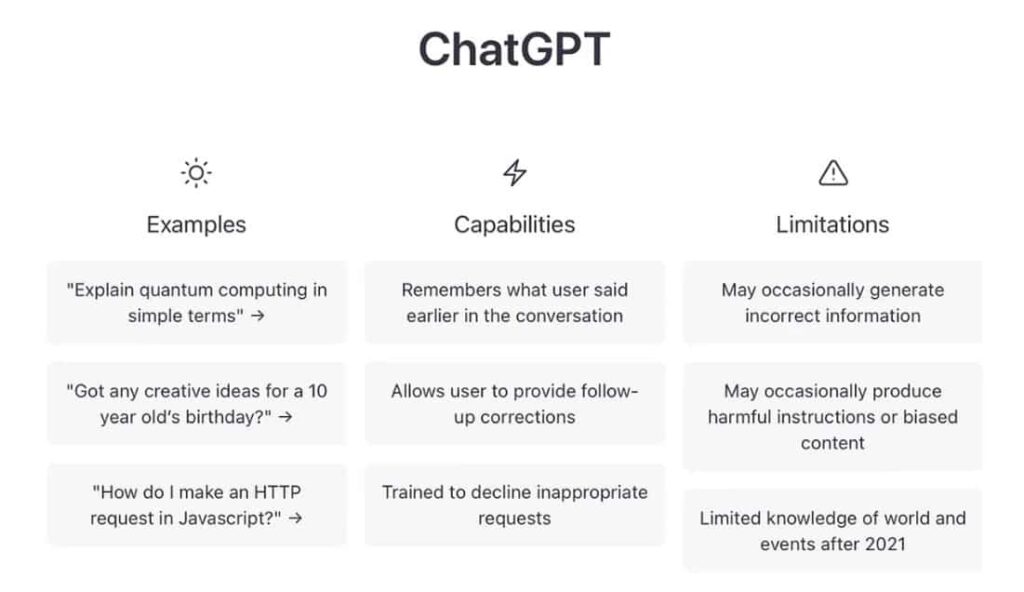AI is more mainstream than we might think.
For some, artificial intelligence (AI) may feel like something right out of science fiction. But the truth is, AI has been in our lives for much longer than many realize. However, it has come a long way since its inception and now plays an increasingly important role in our daily lives. You probably interact with some form of AI on a regular basis.
Think about the digital voice assistant on your Alexa device or when you use facial recognition to unlock your phone.
Netflix, Spotify and social media companies use AI algorithms to suggest what to watch and listen to next and personalize what you see on your feeds.
And the best example of AI at work may be Google’s search engine. It searches the entire internet to find the best answers to your queries.
So, it’s not surprising that AI moved into content creation.
Now you might wonder what it means for your business. As a content firm and a team of writers, we are also curious.
B2B content marketing agencies are increasingly using artificial intelligence in their operations to create more engaging content that is relevant to their target audience.
For instance, even the most seasoned content marketers and writers have been using AI-powered tools like the Hemingway App and Grammarly to help improve the quality and clarity of their work by pointing out lengthy, hard-to-read sentences and grammatical errors.
Marketers are using AI tools for B2B marketing like SEMrush, Moz and Google Search Console to help them analyze data, identify trends and generate content ideas that content teams and marketers can use to create effective campaigns.

They’re also using AI-driven tools to help automate content tasks such as:
- Keyword research
- SEO optimization
- Content distribution across channels
These writing and production assistants allow us to focus on the creative aspects of our job such as creating compelling stories, visuals, videos and other forms of content.
By leveraging the power of AI, content marketing agencies can produce high-quality content at scale and stay ahead of the competition in an ever-changing digital landscape.
But all this hype of AI being a replacement for human writers?
Surely, I had to see it in action. So, I plugged this prompt into an AI writing tool:
“What are the implications of using AI to generate content for distributors?”
It generated this:
Efficiency and Scalability:
- Positive: AI can significantly enhance the efficiency of content creation, enabling distributors to produce a vast amount of high-quality content in a relatively short time.
- Negative: Over-reliance on AI may lead to a lack of human touch in content, potentially affecting the emotional resonance and authenticity of the material.
Audience Personalization:
- Positive: AI algorithms can analyze audience data to personalize content, ensuring that it resonates with specific demographics and individual preferences.
- Negative: There’s a risk of algorithms reinforcing existing biases if not properly curated, potentially limiting the diversity and inclusivity of the content.
Data-Driven Insights:
- Positive: AI-powered analytics can provide distributors with valuable insights into audience behavior, allowing for more informed decision-making in content strategy.
- Negative: The reliance on algorithms may overlook the qualitative aspects of audience feedback and fail to capture nuanced preferences.
Cost Savings:
- Positive: Automating content creation through AI can lead to cost savings for distributors, as it reduces the need for extensive human involvement in repetitive tasks.
- Negative: Initial investment in AI technology and potential job displacement may pose financial and ethical challenges for some distributors.
Content Variety and Innovation:
- Positive: AI can inspire creativity and innovation by suggesting novel ideas and generating diverse content formats that may not have been explored by human creators.
- Negative: There is a risk of content becoming formulaic or lacking in originality if AI systems rely too heavily on existing patterns and data.
Brand Consistency:
- Positive: AI ensures consistency in branding by generating content that aligns with established brand guidelines, fostering a cohesive and recognizable identity.
- Negative: Striking a balance between consistency and adaptability can be challenging, as AI may struggle to capture the evolving nuances of a brand’s identity.
Ethical Considerations:
- Positive: AI can assist in moderating content for ethical concerns, filtering out inappropriate material and adhering to content guidelines.
- Negative: Ethical challenges arise in ensuring responsible AI use, avoiding biases, and maintaining transparency in how AI influences content creation and distribution.
Human-AI Collaboration:
- Positive: Collaboration between human creators and AI systems can lead to more powerful and innovative content, leveraging the strengths of both.
- Negative: Striking the right balance in this collaboration is crucial to avoid alienating human creativity and intuition in the content creation process.
What did you think of the output? Did you think it was engaging? If you’re a distributor, did it speak to you? Or did you feel this was a generalization?
Learn more about AI for distributors. >>
If you’re like me, you may have mixed views. Certainly, it provided a great baseline response and valid points, but when you get down to the nitty-gritty, all I see are 371 words that don’t speak to the unique challenges in distribution.
It’s missing the human element; the “why should I care and what’s in it for me” quotient.
However, I am intrigued. I can see there is potential for value despite the undoubted skepticism surrounding the topic of AI and its use in content marketing. I believe in constant improvement, and I am always looking for tools that help me do my job better.
That’s why I decided to keep an open mind before drawing my trusty quill and readying for battle against the onslaught of copywriting robots said to be coming for my job.
So, I dove into this new and evolving world to uncover the pros and cons of AI in B2B content marketing.
Here’s what I discovered.
What are the Pros and Cons of Using AI Tools in B2B Content Creation?
Content experts have long debated the use of AI in content writing. Some believe it can be used to automate and streamline the process, while others are concerned about its potential impact on quality.
Despite these fears, AI is beginning to make its mark in the industry by providing content writers with tools to help them create better and more engaging content.

When used properly, some AI-powered tools can:
- Analyze data and generate insights to improve a writer’s work.
- Employ AI-driven algorithms that account for user preferences when creating content.
- Provide a more personalized experience for the audience.
- Brainstorm new pieces of content based on existing work.
However, when used improperly, AI-powered tools produce low-quality content:
- Lacking empathy, emotion and the human touch readers crave.
- That’s tone-deaf or even offensive.
- With inaccurate and potentially dangerous elements.
So, while content experts agree that AI can be a powerful tool for improving the quality of content writing, they also caution against relying too heavily on this technology. Ultimately, it’s up to human writers to ensure their work is engaging, accurate and relevant to their target audience.
It’s true. These tools can produce positive results for content producers and their clients, but we must not turn a blind eye to the potential downfalls of using AI.
AI-Driven Content: Putting the Buzz to the Test
Our social media feeds are abuzz with industry experts sharing their take on the latest tools to hit the scene. ChatGPT and other AI tools for content writing are among the top-trending topics.
I’ve experimented with some of the most popular AI tools, such as Rytr and Jasper. I’ll admit that I see many potential benefits, particularly in topic and keyword research, article outlines and content optimization. After all, there’s nothing wrong with using tools to flesh out existing content or brainstorm potential topic ideas.
In fact, using tools to eliminate mundane or routine tasks associated with content is smart. I get to spend more time crafting meaningful, impactful words.
However, each time I attempted to use AI to inspire content, I had to spend a considerable amount of time editing it to something I would be willing to turn into my editor. The generated results often resembled a high school research report rather than an engaging read.
I’m on the fence (and probably a bit biased) so I looked to other content marketing leaders and to learn what they had to say:
-
Neil Patel, Co-Founder of Crazy Egg, Hello Bar and KISSmetrics says: “ChatGPT and other AI tools are great for helping you write content faster. But it still is not great for email marketing. Email marketing is most effective when you segment your list and send people SPECIFIC CONTENT for what they are looking for. Email copy needs to be CUSTOMIZED. AI copy is rarely ready to go without adjustments to fit your purposes. You might get open rates up, but you’re unlikely to generate sales or conversions if you take AI content as is for your email marketing. This is something my company NP Digital has tested out with over 50 million emails. In almost all cases, the human-tweaked copy beat out ChatGPT without customization.” (LinkedIn)
-
Robert Rose, Founder and Chief Strategy Officer of The Content Advisory says: “AI has no wisdom. Wisdom is the very human quality of having the experience, knowledge, emotional intelligence and sound judgment to help with decisions. Unfortunately, AI can’t currently combine these things. Therefore, it can’t judge the wisdom of or originate your next differentiated white paper or e-book. It won’t create the most original idea for how you should approach your new podcast. It won’t write the next visionary business book. But it can produce something that fits the model of each of those.” (Content Marketing Institute)
- Janssen Manno, Director of SEO at CadenceSEO says: “As consumers and major marketing channels adapt to the [AI] phenomenon, there will be an increased demand for truly unique and interesting creative content, as well as for ‘AI content marketers’ who know how to leverage AI to create quality content at scale and in the appropriate context.” (LinkedIn)
Warning: Don’t get too comfortable one way or the other! These insights are likely to change as AI evolves over time. We’ll see improvements in some fundamental areas, while other new concerns pop up. Just like content on your website and blog need to be revisited and updated from time to time, so must our perceptions of artificial intelligence.
What’s All the Fuss about ChatGPT for Content Creation?
ChatGPT is all the rage right now.
Touted as the most powerful AI tool in the world (according to my LinkedIn feed), ChatGPT is a chatbot launched by OpenAI, a research lab based in San Francisco, California.
GPT stands for “Generative Pre-trained Transformer” and is an up-and-coming solution using machine learning to generate human-like conversations.
Needless to say, I had to see what all the fuss was about. So, my curiosity led me on a research expedition where I quickly uncovered an article on The Verge, a technology news website operated by Vox Media.
Here, they discussed the accuracy issues experts have discovered with the technology:
“Stack Overflow, the go-to question-and-answer site for coders and programmers, has temporarily banned users from sharing responses generated by AI chatbot, ChatGPT. ChatGPT simply makes it too easy for users to generate responses and flood the site with answers that seem correct at first glance but are often wrong on close examination.”
A moderator for Stack Overflow reported, “The primary problem is that while the answers which ChatGPT produces have a high rate of being incorrect, they typically look like they might be good and the answers are very easy to produce. So, for now, the use of ChatGPT to create posts here on Stack Overflow is not permitted. If a user is believed to have used ChatGPT after this temporary policy is posted, sanctions will be imposed to prevent users from continuing to post such content, even if the posts would otherwise be acceptable.”
To this point, here is a snapshot of the initial ChatGPT homepage:

Limitations to Consider as AI Evolves
Note: ChatGPT’s capabilities and limitations are likely to evolve, not only as the tool gets smarter but as we learn how to use it.
Besides accuracy issues, there are other limitations to using AI that may include an inability to understand context or process nuance such as sarcasm, irony or figurative language.
Or a predisposition to human manipulation.
A recent article from IBM, titled “Shedding light on AI bias with real world examples,” addresses how people can manipulate output to match certain biases. As organizations increase their use of artificial intelligence, there is a risk of human biases being baked into the AI models, then distributed at scale.
AKA: Garbage in, garbage out (GIGO).
We have to be mindful of the input data that is driving output results.
As explained in a 2022 National Institute of Standards and Technology (NIST) article titled, “There’s More to AI Bias Than Biased Data, NIST Report Highlights,” rooting out bias in artificial intelligence will require addressing human and systemic biases as well.
“Context is everything,” said Schwartz, principal investigator for AI bias at the NIST. “AI systems do not operate in isolation. They help people make decisions that directly affect other people’s lives. If we are to develop trustworthy AI systems, we need to consider all the factors that can chip away at the public’s trust in AI. Many of these factors go beyond the technology itself to the impacts of the technology, and the comments we received from a wide range of people and organizations emphasized this point.”
Sam Altman, CEO of OpenAI has said AI is evolving more rapidly than previous technologies and “we have to be somewhat uncomfortable as a tool builder with some of the uses of our tools.”
In a 2024 interview with Ina Fried at Axios news, Altman said he believes future AI products will need to allow “quite a lot of individual customization” and “that’s going to make a lot of people uncomfortable,” because AI will give different answers for different users, based on their values preferences and possibly on what country they reside in.
Why AI Will Not Replace Content Writers (At least not anytime soon)
Does AI have the capability to create content just as well as a human writer?
With the emergence of AI content writing capabilities, many people wonder whether this technology will replace human writers.
The short answer is no.
Artificial intelligence (AI) is a great tool that can augment the quality of content, but it should not be seen as a replacement. Because in its present state, AI cannot provide the creative and emotional aspect of writing that only humans can bring to the table, nor can it capture subtle nuances.
Instead, it should be seen as an assistant that helps writers perform functions like topic research and outlines, saving time in the brainstorming process, and enabling them to create more impactful content.
John Warner, education writer, speaker, consultant and former faculty at the College of Charleston, wrote something that resonated with me.
He said, “ChatGPT is not generating meaning. It is arranging word patterns. ChatGPT can’t kill anything worth preserving.”
It’s true. In its present form, AI can certainly elevate bad writing, it can even produce writing that can pass as “pretty good.” But connecting human beings through the power of words? We’ll leave that to the professionals.
Robert Rose, Founder and Chief Strategy Officer of The Content Advisory, says, “Some people likely will use generative AI technology in a way that harms the creative process and creators. But it’s just as likely that some people will leverage the technology to further the craft of writing – and challenge the rest of us to use the tool to get better at it.”
I’m happy to incorporate AI into my content strategy to elevate my clients’ content, and I am not afraid of it replacing writers like myself. Because here’s what artificial intelligence can’t do:
- Speak to your people and your customers to learn what makes them tick.
- Focus on building and sustaining relationships that are important to you.
- Perform routine gut checks on the quality and accuracy of content.
- Help business leaders and employees share their stories and experiences.
- See the big picture and help you create long-term strategies.
- Help you develop your brand voice.
You can stay in the middle of the pack, or you can lead it.
The key to brand recognition and market share is to differentiate your business from everyone else. In life and in business, to stand out from the rest, you must tell your story. Why should customers choose you? How are you different?
The future is here, and we must adapt to it. Using technology to make our processes more efficient and streamlined — I am all for it and excited to immerse myself in this new world. But make no mistake, the collection of words gathered and assembled by a chatbot will not tell your unique story.
At least yet.
So, what does this mean for your distribution business? I explore the benefits and drawbacks of using AI to generate content for distributors in the next blog, How Distributors Can Use AI for Industrial Marketing Content.
Curious about how we at 3 Aspens Media help B2B businesses tell their stories? Reach out at info@3aspensmedia.com, or check out further resources on our blog.



